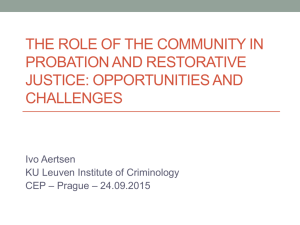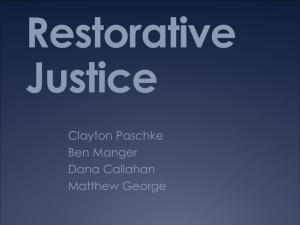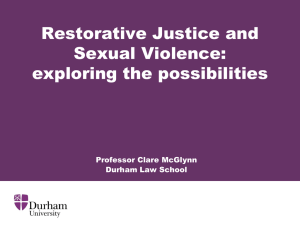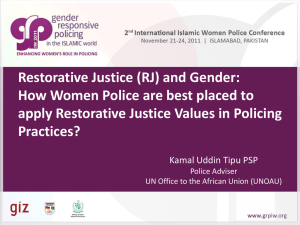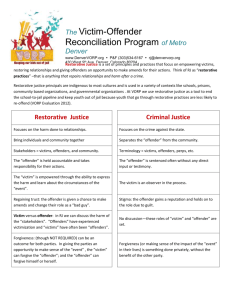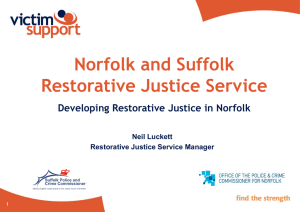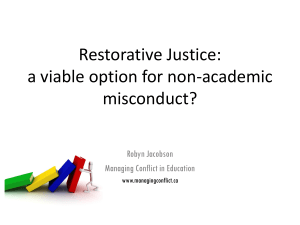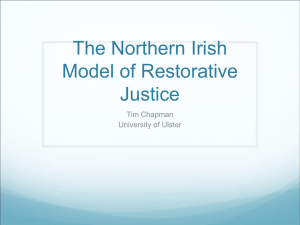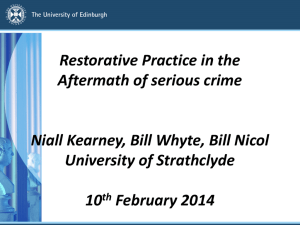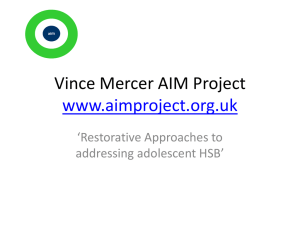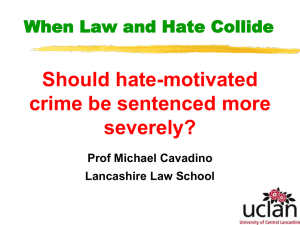Restorative Justice & The Probation Service
advertisement
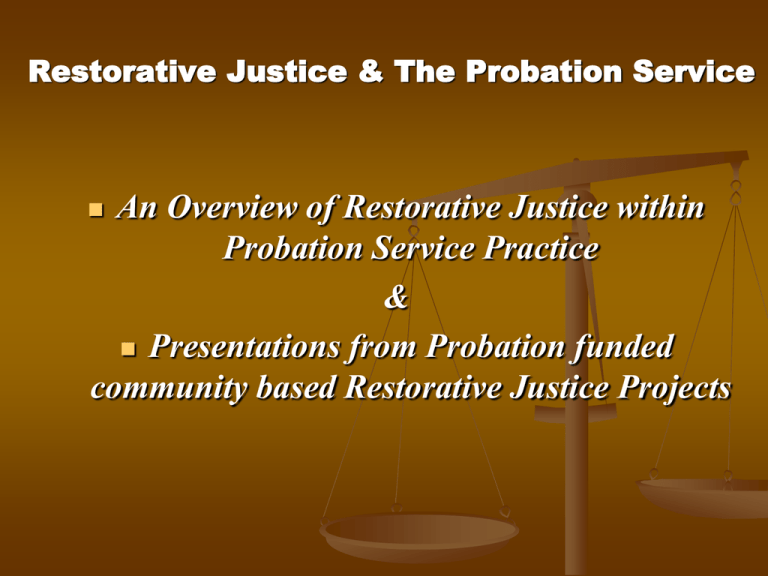
Restorative Justice & The Probation Service An Overview of Restorative Justice within Probation Service Practice & Presentations from Probation funded community based Restorative Justice Projects Probation Service and Restorative Justice - An overview Probation Service Mission, Values and Ethos Probation Service Strategic Goals Restorative Justice in the Probation Service Probation Service and Victims Strategic Goals: To reduce re-offending to create safer communities Reduce re-offending and victimisation through promoting and managing community sanctions Build and develop strategic alliances and partnerships Enhance our organisational capability, excellence and innovation Restorative Justice within Probation Practice Dedicated Restorative Justice projects (Reparation Panels / Victim Offender Mediation) Family Conferencing - Children Act 2001 (Conferencing) Community Service / Community Return ( Reparation) Midlands Traveller Conflict and Mediation Initiative (Victim / Offender Mediation) Development of Restorative Thinking and Restorative Dialogue in the Assessment and Supervision of Offenders Probation Service and Victims Victim Charter Victim Services Co-ordinator – ‘Single Point of Contact' Information, Support & Referral Victim Impact Assessments Victim Sensitive Approach to Working with Offenders Brief Overview 2000 – 2010 Restorative Justice Services & Nenagh Community Reparation Services RJS and NCRP established 2000 Providing Reparation Model to local courts Low tariff offences First time / low level Offenders Completion DPOA / Strike out RJS – also provides Victim / Offender Mediation Core elements of the Restorative Model Court referred - Pre- sentence Reparation panels (Stakeholders) Contract of reparative actions Supervision of contract Return to court for sanction National Commission on Restorative Justice - Report 2009 Recommendations … Particular focus on 3 models Offender Reparation Victim Offender Mediation YPP Conferencing Acknowledging potential benefits for victims Improve cost effectiveness of the models Existing services to expand Accommodate higher tariff cases / offenders Increase number of case referrals Advancing National Commission Report Recommendations / Targets Structural and organisational change Reallocation of resources Reviewing the service delivery model Facilitating the participation of victims Expand the geographical area of service delivery and provide service to more Courts Promote the Higher Tariff model and engage the key stakeholders in the new locations and courts Identify opportunities for further involvement and input from community sector Results and Outcomes Positive buy in from the stakeholders Significant increase in number of referring courts and referrals Models now processing Higher Tariff offences Changing profile of the referred offender Increased focus on victim interests Court sanction – changing context Challenges and Opportunities Managing future growth within the context of current resources whilst maintaining a high standard of service delivery and ensuring best practice Ensuring the RJ models are delivering for all - Participants - Stakeholders Continuing to be proactive in identifying and providing appropriate roles for the Community Sector Consolidating and strengthening relationships with the stakeholders and learning from each others experiences Aims of the Limerick RJ Project (in conjunction with YPP) Promote Community Safety Reduce the Fear of Crime Reduce the incidence of youth crime and anti social behaviour Le Chéile Restorative Justice Project What the Restorative Justice Project is A Limerick Based project – which aims to establish a model/framework for professional practice in Restorative Justice with Young offenders. Working with young people aged 12-18years. It is a multi agency response to youth offending. It promotes a new way of thinking in terms of RJ practices across the community, voluntary and statutory sector. Le Chéile Restorative Justice Project Restorative Justice Initiative Le Chéile Restorative Justice Options: 1. Restorative Conference 2. Victim Offender Mediation 3. Victim Impact Panel 4. Victim Empathy Programme 5. Reparation Case Study Violent Assault Two Victims Gang of Youths Alcohol Peer Pressure Night Time Quotes Young Person: “I was stuck for words...... I didn’t know how to say I was sorry”. Victim: “Very positive, rewarding & a very worthwhile process”. Family Member: “Why wasn’t this done years ago. I have seen huge changes in my son since he started working here. I trust him more”. Limerick RJ - Progress to Date RJ Advisory Group CSC- RP Subgroup IIRP Training Training Modules for RJ & VIP designed RJ Volunteers Trained and in supervision Pool of Victims trained for Victim Impact Panel Victim Empathy Programmes designed Prescriptive procedures for all RJ models Host Agency for Reparation identified and staff trained. Interagency collaboration with statutory, community and voluntary sector Procedures outlined for engaging victims of crime with An Garda Siochana and Support After Crime Next Steps Extend and strengthen our dedicated restorative justice projects Increase awareness and promote the use of restorative justice as a viable sanction Increased role for Community Members/ Volunteers Develop more inclusive and sensitive victim services Implement good practice and consistent standards To Conclude … Offenders are at the centre of what we do Victims are at the centre of our concern Community is at the centre of our practice Restorative Justice has the potential to be at the centre of the solution
